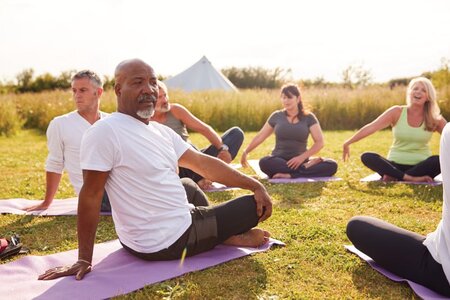4 min read
Last updated 10/28/22
Mental Health Wellness Strategies


As a mental health therapist, I appreciate the concept of “mental health wellness.” The word “wellness” strikes me as hopeful and implies the focus is on well-being and striving for the maintenance of long-term healthy behaviors. There are so many strategies that can support a person in better managing their mental health.
Inspired by Psych Hub’s “Mental Health Wellness Tips” YouTube video, let’s dig deeper into the following mental health wellness strategies!
FOCUS ON THE POSITIVE
By focusing solely on the negative aspects of life, the positive emotions, thoughts, relationships, and experiences that exist can easily pass us by. Thus, acknowledge and show appreciation for the positive aspects of life as this can lead to more balanced thinking.
Here are some ways to think and behave in a more positive, optimistic way:
- Check your thoughts
- Frequently during the day, stop and evaluate what you’re thinking
- If your thoughts are mostly negative, try to find a way to put a positive spin on your thoughts
- Surround yourself with positive, supportive people
- Practice positive self-talk
- Don’t say anything to yourself that you wouldn’t say to someone else
- Be gentle and encouraging with yourself
- If a negative thought enters your mind, evaluate it rationally and respond with self-affirmations
The health benefits that positive thinking may provide include:
- Increased life span
- Lower rates of depression
- Lower levels of distress and pain
- Greater resistance to illnesses
- Better psychological and physical well-being
- Better cardiovascular health and reduced risk of death from cardiovascular disease and stroke
- Reduced risk of death from cancer, respiratory conditions, and infections
- Better coping skills during hardships and times of stress
PRACTICE GRATITUDE
I have observed clients gain a sense of joy, comfort, and peace by acknowledging people or things they feel grateful for.
Gratitude is “a sense of thankfulness and happiness in response to receiving a gift, either a tangible benefit (e.g., a present, favor) given by someone or a fortunate happenstance (e.g., a beautiful day)” (APA Dictionary of Psychology).
There are various ways to cultivate gratitude
- Express gratitude verbally or through writing and art
- Write a gratitude letter for yourself, a loved one, a family animal, etc.
- Keep a gratitude journal
- Challenge yourself to come up with 3 things you are grateful for every day
- Create or craft something that signifies who or what you are grateful for
- Engage in prayer or meditation
- People who are religious or spiritual can pray to cultivate gratitude
- Practice mindfulness meditation by shifting your focus from your thoughts to pleasant sensory experiences happening at the moment
- Express gratitude for these sensory experiences
- Bring to mind people you are grateful for in your life
- Notice what you feel holding these people in your awareness
CONNECT WITH OTHERS
There is so much healing that can happen by having and maintaining positive, warm relationships with others. In contrast, a lack of social connection can lead to feelings of loneliness and isolation. Loneliness is associated with a variety of mental health (e.g. depression) and physical health disorders (e.g. coronary heart disease, hypertension) (Mushtaq et al., 2014).
How can relationships with others be strengthened?
- Seek a more personal connection when possible
- Meet with people in person instead of through other less personal forms of communication such as text messaging and email
- Engage in mutually enjoyable activities together
- Walk together in the park, enjoy a tasty treat together, play a board or card game, or listen to a podcast together and discuss
MAINTAIN PHYSICAL HEALTH
Maintaining physical health is so important for your mental health and overall well-being. When thinking about how the mind and body are intertwined, consider the effects of stress. For example, stress can cause anxiety and overwhelmed feelings (impacts on the mind) and lead to headaches or muscle tension (effects on the body).
Here are a few strategies to maintain or improve physical health:
- Eat wholesome, nutritious foods
- Hydrate
- Keep a water bottle nearby and drink water throughout the day
- Move your body
- Opt for the stairs instead of the elevator
- Take phone calls while walking
- Go for a walk, bike ride, or other enjoyable physical activity
- Prioritize sleep
- Develop and practice a bedtime routine or ritual
- This may include disconnecting from electronics, taking a bath or shower, listening to relaxing music or meditation, etc.
APPLY MENTAL HEALTH WELLNESS STRATEGIES TODAY!
Thank you for taking the time and effort to dive deeper into various mental health strategies. This is a small, but important step towards prioritizing your most valuable asset- you! It is important to keep in mind that although mental health strategies are wonderful tools, they are not a substitute for professional mental health services. Read on to learn more.
SEEK PROFESSIONAL MENTAL HEALTH SERVICES
Mental health services such as counseling and psychiatry can help you or your loved one improve your well-being.
If you or your loved one are in crisis, 911 can be contacted for medical emergencies and 988 can be contacted for mental health emergencies.
For a non-emergency situation, it is best to seek professional medical and/or mental health care. If you have a positive relationship with your primary care physician or other physicians, ask them for a referral for mental health services. If your child is seeing a pediatrician, ask them where they can go to receive mental health services. It may also be helpful to consult with your insurance provider to determine which mental health services they will provide coverage for.
References
Mayo Clinic Staff. (2022, February 3). Positive thinking: Stop negative self-talk to reduce stress. Mayo Clinic. https://www.mayoclinic.org/healthy-lifestyle/stress-management/in-depth/positive-thinking/art-20043950
Mayo Clinic Staff. (2021, March 24). Stress symptoms: Effects on your body and behavior. Mayo Clinic. https://www.mayoclinic.org/healthy-lifestyle/stress-management/in-depth/stress-symptoms/art-20050987
Mushtaq, R., Shoib, S., Shah, T., & Mushtaq, S. (2014). Relationship Between Loneliness, Psychiatric Disorders and Physical Health ? A Review on the Psychological Aspects of Loneliness. Journal of Clinical & Diagnostic Research: JCDR, 8(9), WE01-WE04. https://www.ncbi.nlm.nih.gov/pmc/articles/PMC4225959/
VandenBos, G. R. (Ed.). (2007). APA Dictionary of Psychology. American Psychological Association. https://dictionary.apa.org/gratitude
(2021, August 14). Giving thanks can make you happier. Harvard Health Publishing Harvard Medical School. https://www.health.harvard.edu/healthbeat/giving-thanks-can-make-you-happier
988 Suicide & Crisis Lifeline. https://988lifeline.org/current-events/the-lifeline-and-988/
